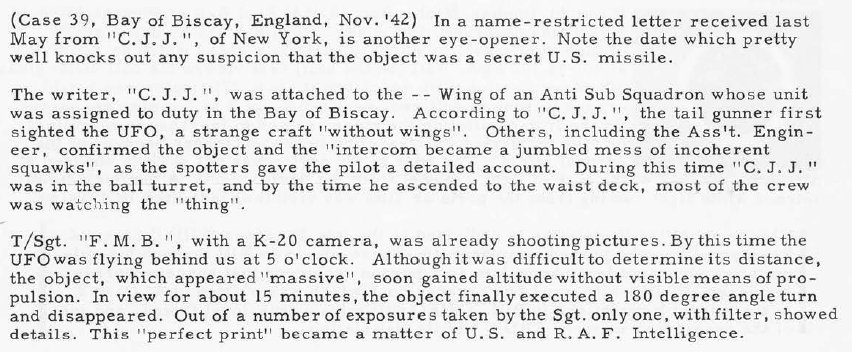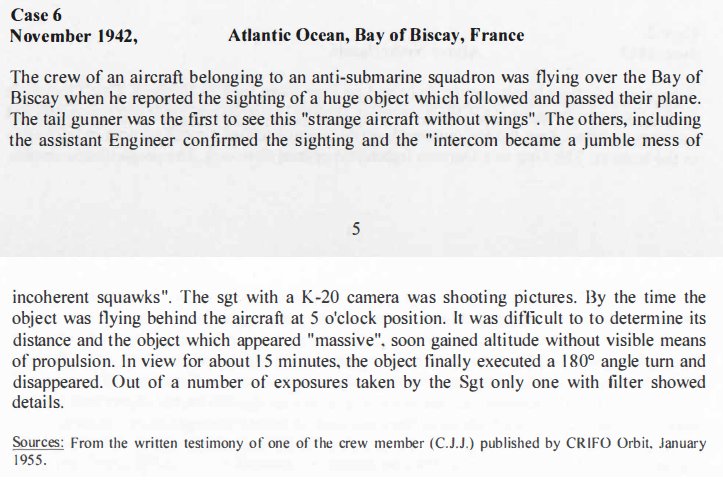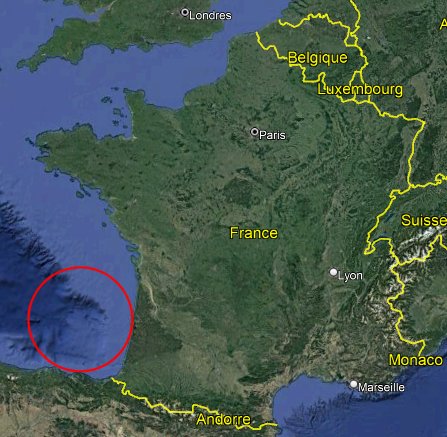ACUFO-1942-11-00-BAYOFBISCAY-1
Leonard H. Stringfield was a US ufologist who was somehow "specialized" in what was later called "whistleblower" testimonies about UFOs. He edited a newsletter called Orbit, and in the January 1955 issue, he noted a case that came from New York on May 1955, from one "C. J. J."; who had not revealed his full name.
Springfield noted that the letter was about a UFO sighting in the Bay of Biscay, "England" - actually France, of course - in November 1942.
"C. J. J." wrote that he was attached to an undisclosed Wing of "an Anti Sub Squadron whose unit was assigned to duty in the Bay of Biscay."
According to "C. J. J.", the tail gunner first sighted the UFO, a strange craft "without wings". Others, including the Assistant Engineer, confirmed the object and the "intercom became a jumbled mess of incoherent squawks" from the crew, as the spotters gave the pilot a detailed account.
During this time "C. J. J." was in the ball turret, and by the time he ascended to the waist deck, most of the crew was watching the "thing".
Technical Sergeant "F. M. B. ", with a K-20 camera, was already shooting photos. "By this time the UFO was flying behind us at 5 o'clock", wrote "C. J. J.".
Although it was difficult to determine its distance, the object, which appeared "massive", soon gained altitude without visible means of propulsion. In view for about 15 minutes, the object finally executed a 180 degrees angle turn and disappeared.
Out of a number of exposures taken by the Technical Sergeant, only one, "with filter, showed details". This "perfect print", the letter said, "became a matter of U.S. and R.A.F. Intelligence."
This later appeared, summarized, in several ufological catalogues, but without additional information.
| Date: | November 1942 |
|---|---|
| Time: | ? |
| Duration: | ? |
| First known report date: | January 1955. |
| Reporting delay: | Hours, 13 years. |
| Country: | France |
|---|---|
| State/Department: | ? |
| City or place: |
| Number of alleged witnesses: | Several. |
|---|---|
| Number of known witnesses: | 1 |
| Number of named witnesses: | 0 |
| Reporting channel: | Crew report, anonymous letter. |
|---|---|
| Visibility conditions: | Night. |
| UFO observed: | Yes. |
| UFO arrival observed: | ? |
| UFO departure observed: | Yes. |
| UFO action: | Approaches, climbs, stays 15 minutes, turns 180 degrees, departs. |
| Witnesses action: | Take photographs. |
| Photographs: | Yes. |
| Sketch(s) by witness(es): | No. |
| Sketch(es) approved by witness(es): | No. |
| Witness(es) feelings: | Puzzled. |
| Witnesses interpretation: | ? |
| Sensors: |
[X] Visual: Several
[N/A] Airborne radar: [ ] Directional ground radar: [ ] Height finder ground radar: [X] Photo: 0 [ ] Film/video: [ ] EM Effects: [ ] Failures: [ ] Damages: |
|---|---|
| Hynek: | ? |
| Armed / unarmed: | Armed, machine guns. |
| Reliability 1-3: | 1 |
| Strangeness 1-3: | 3 |
| ACUFO: | Unknown credibility. |
[Ref. lsd1:] LEONARD H. SPRINGFIELD:

|
(Case 39, Bay of Biscay, England, Nov. '42) In a name-restricted letter received last May from "C. J. J.", of New York, is another eye-opener. Note the date which pretty well knocks out any suspicion that the object was a secret U.S. missile.
The writer, "C. J. J.", was attached to the - - Wing of an Anti Sub Squadron whose unit was assigned to duty in the Bay of Biscay. According to "C. J. J.", the tail gunner first sighted the UFO, a strange craft "without wings". Others, including the Ass't. Engineer, confirmed the object and the "intercom became a jumbled mess of incoherent squawks", as the spotters gave the pilot a detailed account. During this time "C. J. J." was in the ball turret, and by the time he ascended to the waist deck, most of the crew was watching the "thing".
T/Sgt. "F. M. B. ", with a K-20 camera, was already shooting pictures. By this time the UFO was flying behind us at 5 o'clock. Although it was difficult to determine its distance, the object, which appeared "massive", soon gained altitude without visible means of propulsion. In view for about 15 minutes, the object finally executed a 180 degree angle turn and disappeared. Out of a number of exposures taken by the Sgt. only one, with filter, showed details. This "perfect print" became a matter of U.S. and R.A.F. Intelligence.
[Ref. jcf1:] JEROME CLARK AND LUCIUS FARISH:
What may be one of the best UFO photographs in existence lies buried in U.S. and British intelligence files, if we are to credit the testimony of "C.J.J.", an informant known to ufologist Leonard Stringfield.
C.J.J. was attached to a wing of an antisubmarine squadron that patrolled the Bay of Bascay off France. One day in November 1942, the plane's tail gunner spotted a "massive" object without wings, which appeared, suddenly, behind the bomber. Stunned at the strange sight, he alerted the rest of the crew, including C.J.J., who was in the nose turret. By the time he climbed into the waist gunner's position, virtually everyone on board was watching the "thing," which remained in sight for 15 minutes. Sgt M.F.B. was busy taking pictures with a K-20 camera.
The object soon gained altitude and did an abrupt 180-degree before disappearing.
Only one of the pictures--the one taken with a filter--turned out, and it was, in C.J.J.'s words, "a perfect print." Today, more than 30 years later, it has yet to be released.
[Ref. ibl1:] ILLOBRAND VON LUDWIGER:
Leonard Stringfield, an American UFO researcher, knows an informant who took an excellent photo of such an object. Unfortunately, these pictures are still under lock and key at American and British intelligence agencies.
In 1942, Mr. "C.J.J." was part of a submarine-chasing squadron that operated in the Bay of Biscay. One November day, the tail gunner of a plane noticed a "massive" object without wings that suddenly appeared - as if from nowhere - behind the bomber. Excited, he immediately informed the rest of the crew, including Stringfield's informant, who was crouched in the cockpit. One after the other, they climbed into the tail gunner's observation post to see the strange object.
The thing remained visible for a total of 1.5 minutes. Sergeant 'F.M.B.' took several photos with his K-20 camera. Towards the end of the sighting, the object flew skyward, made a sudden 180-degree turn and disappeared. After developing the pictures, it was found that the images were unusable except for one that had been taken with a filter. This picture, which was a perfect print in the words of C.J.J., has not been released to this day (Clark/Farish 1975, p. 45).
[Ref. lwr1:] DR. LOUIS WINKLER:

|
1942 Nov/west coast of France/TFSUFO (1977 n.5)
A large object appeared behind the airplane, then overtook and paced it for 15 min. Eventually it gained altitude and made a 180° turn. The object was photographed.
The source “TFSUFO” is detailed at the end of the catalogue as “True Flying Saucers and UFOs 1977 n.5”.
[Ref. gvo1:] GODELIEVE VAN OVERMEIRE:
1942, November
at sea, Gulf of Biscay
C.J.J. (identity known by Leonard Stringfield) was a member of a squadron patrolling the bay as part of submarine defense. The rear gunner, in the plane, suddenly saw a massive object, without wings, which suddenly appeared behind the plane. He alerted the crew, also C.J.J. who was in the turret. The thing was visible for 15 minutes and Sergeant M.F.B. took photos of it with a K-20 camera. The object gained altitude, made an abrupt 180° turn and disappeared. Only one of the photos was successful and according to C.J.J. it was clean and perfect. Even today this photo remains classified top secret. (Jeroen Wierda - Pufori "The Mysterious Foo Fighters of WWII" 19.5.1997) A huge object followed and overtook the plane. (Acufo's catalog)
[Ref. pre1:] PHILIP R. RIFE:
In 1942, an American bomber on a daytime anti-submarine patrol in the Bay of Biscay off the coast of France suddenly found itself in the role of the hunted instead of the hunter when a UFO came up behind it and flew alongside for 15 nerve-racking minutes. The plane's crewmembers said their uninvited visitor was a huge, wingless cylinder. Before the UFO executed a 180-degree turn and sped away, one airman photographed it with an aerial camera. A “perfect print” of the object was turned over to military intelligence, but nothing was ever released publicly. (267)
The source was described as: "267. Clark, p. 231 268."
[Ref. lhh1:] LARRY HATCH:
470: 1942/11/00 00:00 15 4:00:00 W 46:00:00 N 3311 OCN ATL BSC 6:8
LOC.UNK BAY of BISCAY:MIL-AIR CREWS:BIG WINGLESS OBJ:RFI:180 TURN AWAY:/CRIFO
Ref#171 ALDRICH, Jan: PROJECT 1947 (research) Page No. 0: HIGH SEAS
[Ref. dwn1:] DOMINIQUE WEINSTEIN:
French ufologist Dominique Weinstein compiled a catalog of the cases of UFOs observed from aircraft ([dwn1]). The first case in February 2001 (6th edition) catalog appears as:
|
|
| DATE | 42.11 |
|---|---|
| TIME | |
| COUNTRY | France |
| PLACE | west coast of France, bay of Biscay |
| M | |
| TYPE OF PLANE AND WITNESSES | a military plane (anti-sub. squad) pilot |
| UFO DESCRIPTION | a huge object followed and passed the plane |
| Radar | |
| G | |
| X | |
| E | |
| SOURCES | 366 03 |
The sources "366" and "03" are referenced at the end of the catalog as:
03 Project 1947 Reports, newsclippings and documents (cases from Jan Aldrich and Barry Greenwood)
366 Analysis of UFO-like data before 1947, (FUFOR)
[Ref. mgr1:] MICHEL GRANGER:
As early as 1942 (or even 1940), they [“the Foo-Fighters”] were already there, it seems. In November, an anti-submarine flying squadron patrols the Bay of Biscay. Suddenly, the tail gunman spotted a “massive object”, without wings, suddenly appearing at the rear of the plane. From the head turret, the thing remains visible for 15 minutes then rises in altitude and turns 180 degrees, before blending into the sky.
[Ref. dwn2:] DOMINIQUE WEINSTEIN:

|
The crew of an aircraft belonging to an anti-submarine squadron was flying over the Bay of Biscay when he reported the sighting of a huge object which followed and passed their plane. The tail gunner was the first to see this "strange aircraft without wings". The others, including the assistant Engineer confirmed the sighting and the "intercom became a jumble mess of incoherent squawks". The sgt with a K-20 camera was shooting pictures. By the time the object was flying behind the aircraft at 5 o'clock position. It was difficult to to determine its distance and the object which appeared "massive", soon gained altitude without visible means of propulsion. In view for about 15 minutes, the object finally executed a 180° angle turn and disappeared. Out of a number of exposures taken by the Sgt only one with filter showed details.
Sources: From the written testimony of one of the crew member (C.J.J.) published by CRIFO Orbit, January 1955.
[Ref. tww1:] "THE KEW" WEBSITE:
November 1942: a squadron is flying anti-submarine patrol in the Bay of Biscay. Suddenly, the rifleman marks a "solid object" without wings appearing at the rear of the plane. At the turret, the unknown machine remains visible for 15 minutes, then rises in altitude and rotates 180 degrees before melting into the sky.
[Ref. grl1:] GRAEME RENDALL:
Antisubmarine aircraft operating over the Bay of Biscay from Cornwall and long range transports flying over the North Atlantic across to West Africa also had run-ins with mysterious lights that followed their machines, then shot off into the distance.
Nothing is said about the plane, it even appears that the witness did not wish to indicate whether he was in the American of British military - both operated anti-submarine plane patrols over the Bay of Biscay in 1942.
The planes used there for anti-submarine hunting in 1942 were essentially the British Short Sunderland, Vickers Wellington, and US Consolidated PBY Catalina and Consolidated PB4Y-1 Liberator.
All had machine guns defenses in turrets.

|
The "Bay of Biscay" - in French "Golfe de Gascogne", is the area circled in red on the above map.
The combined efforts of RAF Coastal Command, the U.S. Army Air Forces, and the U.S. Navy in the Bay of Biscay were to defeat the German submarines which started operating in 1941 from Brest, Lorient, St. Nazaire, La Rochelle, and Bordeaux.
The report is obviously of very high strangeness. But I am not ready to give it much credence as it amounts only to an anonymous letter, carefully redacted so as to not give away any clue about the nationality of the witnesses.
Unknown credibility.
* = Source is available to me.
? = Source I am told about but could not get so far. Help needed.
| Main author: | Patrick Gross |
|---|---|
| Contributors: | None |
| Reviewers: | None |
| Editor: | Patrick Gross |
| Version: | Create/changed by: | Date: | Description: |
|---|---|---|---|
| 0.1 | Patrick Gross | September 29, 2023 | Creation, [lsd1], [lwr1], [lhh1], [dwn1], [dwn2], [tkw1]. |
| 1.0 | Patrick Gross | September 29, 2023 | First published. |
| 1.1 | Patrick Gross | November 11, 2023 | Additions [jcf1], [gvo1]. |
| 1.2 | Patrick Gross | July 14, 2024 | Additions [mgr1], [grl1], [ibl1]. |
| 1.3 | Patrick Gross | July 23, 2024 | Addition [pre1]. |